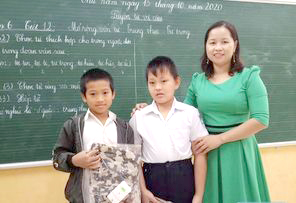 Society
Society

Over the past 19 years, teacher Đỗ Thị Nhàn has always tried to overcome difficulties and improve education in mountainous areas.

|
| Đỗ Thị Nhàn and her students. — Photo giaoduc.net.vn |
YÊN BÁI — Over the past 19 years, teacher Đỗ Thị Nhàn has always tried to overcome difficulties and improve education in mountainous areas.
Nhàn, 40, was born and grew up in the northern province of Hưng Yên. From an early age she dreamed of being a teacher in some of the country’s mountainous regions. And now she teaches at the Tân Lĩnh Junior Secondary and Primary School in Lục Yên District.
Nhàn told the Giáo dục Việt Nam (Việt Nam Education) newspaper that she first went to Yên Bái Province in 1996 as her father worked there. She spent her years of high school in the province.
“At that time, local people were much poorer than at present, but they were honest, genuine and close to each other. Since that time, I thought that no matter what major I study, I would come back to help local people, especially children," said Nhàn.
After graduating from the Vĩnh Phúc College of Education, Nhàn came to Yên Bái Province to teach.
In her first days of being a village teacher, Nhàn struggled to communicate because she did not understand the ethnic minorities’ language.
Nhàn decided to teach a common language for local people, especially children.
“Nineteen years ago, village-based teachers like us had many difficulties with no electricity, no clean water and a lack of infrastructure. For cooking, we had to take water from streams and wood from the forest,” she said.
Despite the obstacles, everyone tried their best to fulfil their tasks.
“I think only love can overcome difficulties and hardship. Now residents understand education and let their children go to school. That is the reward for village teachers after so much hard effort,” said Nhàn.
The sad eyes of children who wish to go to school but do not have books or clothes give her strength to continue her teaching journey in a poor land that is warm with humanity.
Nhàn also acts as “bridge” to connect sponsors with poor students.
“Most students live far from school. Some of them have to travel over several hills and others must come across streams, so they must stop school in flood season,” said Nhàn.
Recently, students living too far are allowed to live at the school and students who have to cross waterways are given money to pay for a ferry service. Thanks to these efforts, the number of students quitting school is falling.
The COVID-19 pandemic had a huge impact on the education sector, meaning students could not go to school and the Tân Lĩnh School tried online learning.
Nhàn said that with students in mountainous provinces, online teaching doesn’t really work, because they do not have the equipment at home, or the internet connection was not stable enough.
In many families, students live with their grandparents because their parents work far from home to earn a living. The grandparents find it difficult to help with e-learning.
Nhàn and her colleagues must go to each village to give students exercises and assign homework.
“Village-based teachers not only bring lessons to students but also bring enthusiasm, dedication and love,” she said.
Besides teaching at school, teachers like Nhàn also try to eradicate illiteracy in villages. They make home visits to teach a common language in the evening because at that time residents return home after a day of work.
“Not everyone is ready to learn. Most of them are old and don’t want to learn new things. We must educate them and change their awareness about learning,” said Nhàn.
Nhàn’s husband also works in the education sector.
“I want to help all students go to school, and ensure they learn. When education improves, people’s lives improve too,” she said.
Hardship will remain, but Nhàn believes that local lives will gradually get better. Some students have returned to the school to support other younger classmates.
“It’s a beautiful image for teachers like us to continue education in mountainous areas,” said Nhàn. — VNS